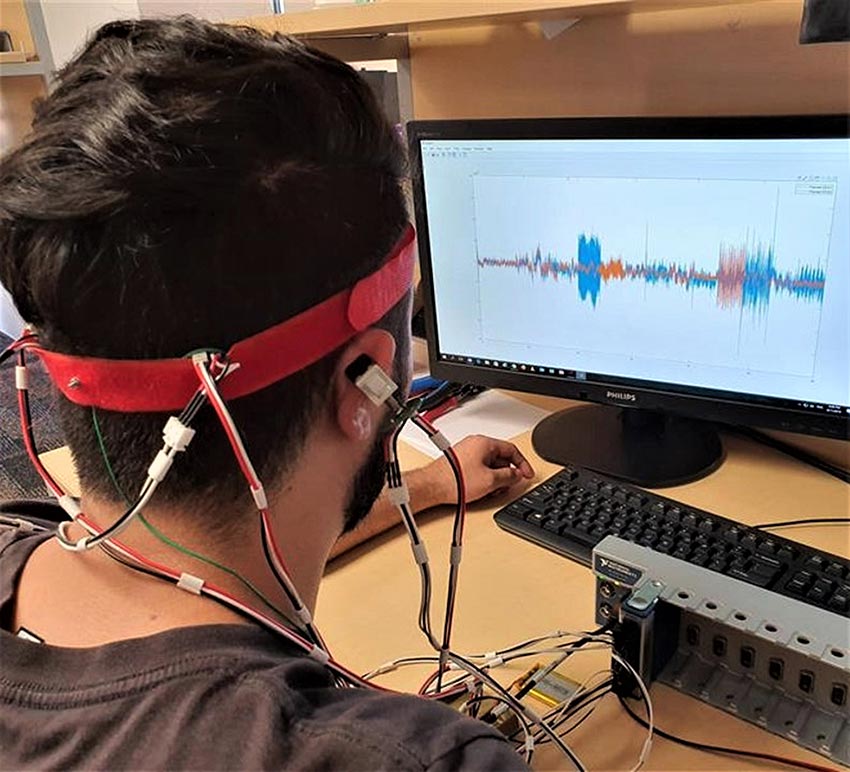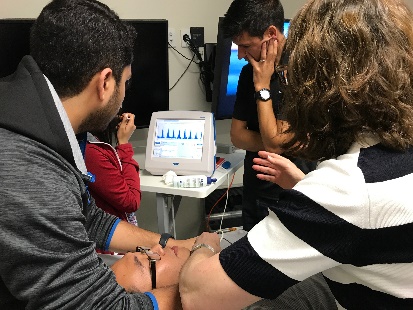Measuring physiology in context
A key area of expertise in IBTEC is the development of technologies that aid and enhance physiological monitoring of human physiological function and activities.
Technologies are being developed to allow clinicians to better monitor patients, and to empower patients to manage their health at home or in the community.
Current projects
Accurately measuring electrical signals of the brain, heart or muscles normally requires careful preparation to apply electrodes. Imagine the possibilities if clinical-grade measurements were available in the real world. We are researching technology for a range of NZ companies to achieve easy-to-use, motion tolerant, long-term, high-fidelity, bio-electric sensing.
External Funders
MBIE Endeavour Smart Ideas, MBIE Endeavour Programme, Te Tītoki Mataora Medtech Research Translator
AUT Team
Andrew Lowe (lead), Gautam Anand, Ekta Dahiya, Mayuresh Kulkarni, Yang Yu, Huiyang Zhang, T’heniel Chetty, Wagner Hoffmann, Matin Khalili, Mahdi Heidarian, Usman Khan
Collaborators
Callaghan Innovation, New Zealand Brain Research Institute, University of Auckland, New Zealand College of Chiropractic

A key challenge facing New Zealand and the rest of the world is the growing burden of cardiovascular disease and its complications. Cardiovascular events such as heart attacks and strokes are now the leading cause of mortality and disease burden globally. A key part of assessing cardiovascular risk is the accurate measurement of human blood pressure, but current devices for automatic blood pressure measurement still suffer from significant measurement errors.
This project aims to develop new technologies to perform these blood pressure measurements more accurately to allow better diagnosis and assessment of cardiovascular risk. It also investigates the impact of measurement errors on risk management.
External Funders
MBIE Endeavour Smart Ideas, Kiwinet
AUT Team
Andrew Lowe (lead), Tet Chuan Lee, Mayuresh Kulkarni, Tanvi Chandel, Victor Miranda
Collaborators
University of Auckland

Cardiovascular disease (CVD) risk for Māori people with diabetes is 30% higher than other ethnic groups. Ways to identify people at high CVD risk, early and more accurately will benefit the community and reduce medical, economic, and social burden.
Pulse wave velocity (PWV), a global measure of arterial stiffness, is an additional, independent predictor of CVD events and responds to cardioprotective medications and lifestyle modifications.
In contrast to European or American Heart Association guidelines, NZ stroke or CVD risk assessment guidelines make no recommendations for measuring arterial stiffness in routine clinical settings. Moreover, there is limited information about the normal and reference values of PWV in the NZ population, particularly for Māori and Pacific peoples.
This research aims co-design community engagement and recruitment to fill in this knowledge-gap.
External Funders
Pūtahi Manawa
AUT Team
Ekta Dahiya (lead), Andrew Lowe
Collaborators
Iwi United Engaged

The Amanaki STEM Academy (ASA) is developing the next generation of Pasifika scientists, technologists, engineers and mathematicians. They’re going to change the world, but why wait until tomorrow? This research project will equip ASA and their students to run an authentic health intervention related to managing blood pressure and blood sugar. Will strong engagement around STEM help with strong engagement for better health?
This research is part of an integrated research module of Pūtahi Manawa.
External Funders
Pūtahi Manawa
AUT Contact
Andrew Lowe (co-lead)
Collaborators
Pūtahi Manawa, Amanaki STEM Academy
There appears to be a significant gap between the type and extent of care that is satisfactory medically, compared to satisfactory to help worried patients live well with and manage their conditions. We have early indications that long-term, wearable, heart rhythm monitoring for these patients would help them make more informed decisions about lifestyle, exercise, and medication, for example.
This research is investigating how wearable monitoring would help patients who have long-term, significant heart conditions manage their own care.
External Funders
Kiwinet
AUT Team
Andrew Lowe (lead), T’heniel Chetty
Collaborators
Iwi United Engaged

Human health and performance are commonly measured using non-invasive sensing of physiological activity inside the body in the healthcare, wellness, and sports sectors. While imaging techniques such as MRI, CT, and ultrasound can measure human tissue geometry and properties, they are bulky and expensive, making them inaccessible to the public.
Bioimpedance shows potential as a non-invasive, portable, low-cost technology to measure geometry (tomography) and properties (spectroscopy) of human tissue and therefore contribute to monitoring physiological function in a range of applications.
AUT Team
Andrew Lowe (contact), Huiyang Zhang, Yang Yu

This research resulted in a clinical decision support mobile application (VitalsAssist) to capture vital signs from medical devices and wearables and present them in a meaningful way to clinicians. It addressed the needs in real-time and remote healthcare monitoring. The App could identify a patient’s deterioration and notify the clinicians so they can take appropriate action.
External Funders
Precision Driven Health
AUT Team
Hamid GholamHosseini, Farhaan Mirza
Collaborators
Orion Health

- VivoVest – measuring daily activity and health
- Skin cancer image recognition
- Radar-based vital signs monitoring
- Advanced lung diagnostics
- Predicting metabolic disease
- Reliable identification of concussion